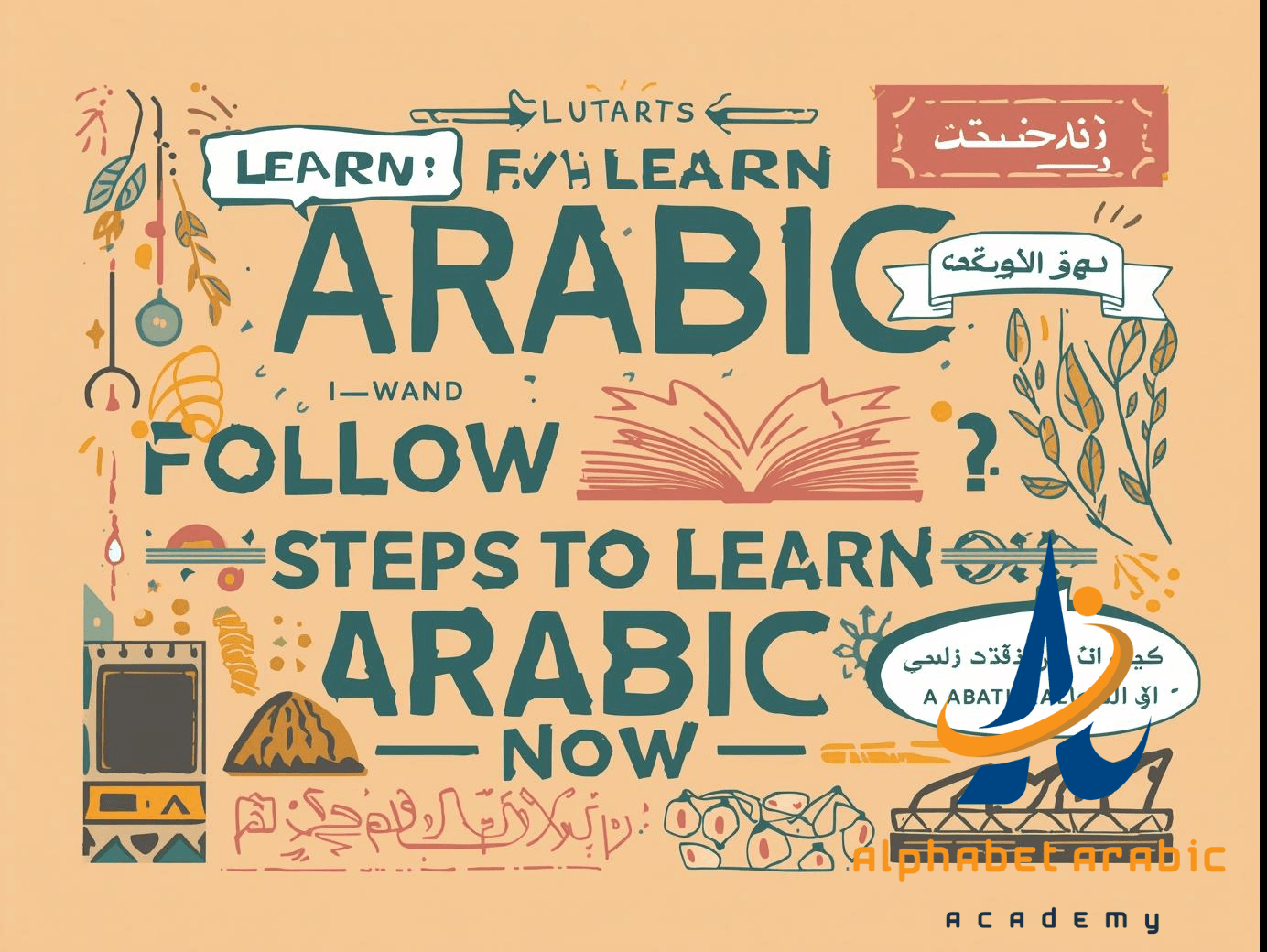
Here in this wonderful article are the simplest steps to learn Arabic online at the hands of expert teachers who are native speakers of the Arabic language from Egypt, with complete ease and without any previous knowledge or experience.
steps to learn arabic might sound like a wild adventure—and it is. It’s not just about picking up a new language; it’s about opening the doors to a world of over 400 million speakers, a rich literary heritage, powerful religious texts like the Quran, and vibrant cultures that stretch from Morocco to the Gulf.
So, if you’re ready to take the leap, let’s not waste time. Here are the 7 smartest steps to learn Arabic fast—no fluff, just what works. Unlock a world of opportunities by choosing to learn Arabic for beginners at our academy.
🅰️ Understanding the Arabic Alphabet — Your Launchpad to the Language
Master the basics first
Let’s be real—you can’t run before you learn to walk. And in Arabic, walking starts with the alphabet. Arabic has 28 letters, written from right to left, each with different forms depending on their position in the word. It’s poetic, artistic, and yes—a little tricky at first.
But here’s the hack: Focus on the sounds, memorize the shapes, and start writing from Day 1. Use apps and alphabet-specific lessons that cover writing, reading, and pronunciation. This isn’t just a step—it’s the foundation. Without it, everything else falls apart.
🗣️ Pronunciation Tips for Beginners — Sound Smart from the Start
Avoid common mistakes
Arabic pronunciation is music to the ears—when done right. Don’t let words like “ع” or “ق” scare you. These sounds exist, and yes, they’re different from English or any Latin-based language, but they’re learnable with listening practice, voice recording, and mimicking native speakers.
Common beginner mistake? Ignoring pronunciation until later. Don’t. It feels similar to operating a vehicle without a steering wheel. Use audio resources, listening apps, and even YouTube pronunciation guides. Your ears provide the most valuable assistance in this situation.
🧾 Start with Common Vocabulary — The Real Words That Matter
Focus on everyday words
Forget fancy textbook sentences that no one uses. Start with phrases you’d actually say:
- Hello
- How are you?
- Where is the bathroom?
You need words for food, emotions, directions, and time—especially if you’re a beginner. A basic vocabulary list of 500-1000 words can transform your understanding of spoken and written Arabic.
Use flashcards, language apps, or even music lyrics to build your vocabulary. Keep it fun, and make it stick.
📘 Learn Basic Arabic Grammar — Structure That Sets You Free
Use simple sentence structures
Grammar in Arabic isn’t scary—it’s just different. You’ll learn that verbs come first, nouns are gendered, and duality (two of something) is a thing. Sounds weird? Maybe. But it starts to make natural sense when you study it the right way.
Start with the basics: pronouns, verbs like “to be” (hint: it’s often invisible!), simple present tense, and negative forms. Avoid jumping to advanced MSA grammar unless you’ve nailed the basics. Grammar = control. Master it, and Arabic becomes a breeze.
🎧Practice Listening and Speaking — Use Your Voice, Not Just Your Eyes
Engage with native speakers
You’ll never learn to speak Arabic by just reading a textbook. Period. Speaking requires listening, mimicking, and real-time conversation. Use language exchange platforms, find private tutors online, or just binge-watch Arabic series with subtitles.
Try “Masri” (Egyptian dialect), “Levantine,” or “Gulf Arabic”—whatever dialect feels closest to your heart. But if you’re looking for formal study or Quran reading, stick to MSA (Modern Standard Arabic).
Pro tip: record yourself speaking and compare with native audio clips. Rinse and repeat.
📱 Use Arabic Learning Apps — Your Pocket Teacher
Boost practice with technology
Apps are a game-changer. From Duolingo and Memrise to specialized tools like Nisreen’s Arabic Lessons or Quran Companion, there’s something for every learner type.
Use apps to memorize vocabulary, review grammar, practice listening, and even join forums like r/learn on Reddit to discuss your progress with thousands of learners. Apps help you study on the go, track your daily streak, and set goals with ease.
Bonus: apps help with Arabic alphabet formation, audio recognition, and sentence-building exercises.
🧭 Steps to Learn Arabic Efficiently — Follow a Structured Routine for Real Progress
Follow a structured routine
You don’t need more resources—you need a plan. Whether you’re a child, student, or adult learner, having a learning program with clear steps, a specific goal, and daily practice time is what gets results.
✅ Set study time (even 20 mins a day)
✅ Choose one dialect or form (MSA or colloquial)
✅ Use a textbook or course with units
✅ Practice listening, reading, writing, and speaking in rotation
And don’t do it alone! we offer complete Arabic courses, including Quran, kids’ lessons, and advanced grammar. Check our pricing and register now. Your future Arabic-speaking self will thank you.
📚 Engage with Arabic Culture — Fall in Love with the Language
Watch films and read books
Learning without culture is like food without flavor. Dive into Arabic music, Netflix shows, and children’s books. It brings phrases to life, shows you real-world usage, and makes learning fun and memorable.
You’ll also gain an appreciation for different dialects, understand colloquial vs. formal, and discover the beautiful poetic side of the Arabic language.
🌐 Join Arabic Language Communities — Grow with Fellow Learners
Benefit from peer support
Whether you join a Reddit group, a WhatsApp study circle, or register for a live online course, community matters. Learning a language is harder alone. Talk with others. Share struggles. Laugh at your mispronunciations.
Join our community and connect with native educators, learners like you, and programs designed for every level.
🧮 Track Your Arabic Progress — Celebrate Every Milestone
Evaluate and improve regularly
Set checkpoints. Track what you’ve memorized, what you can read, and how well you can write or speak. Evaluate every two weeks. Keep a learning journal. Use apps that visualize your progress.
Feeling stuck? Change your lesson type. Try a new manual, listen to different audio, or register for a fresh
🙋♀️ Frequently Asked Questions
❓How much time is needed to master the Arabic language?
That depends on your goals, schedule, and learning method. But with the right structure, some students can speak confidently in 6 months.
❓Is Arabic difficult to learn?
It has its challenges, especially for English speakers, but it’s not impossible. With practice, patience, and the right resources, Arabic becomes easy and fun to learn.
🚀 Ready to Start Your Arabic Journey?
Arabic is not just a language—it’s a key to understanding people, culture, and even yourself. Whether you’re learning for travel, Quranic study, career advancement, or just curiosity, there’s no better time to start than now.
👉 Start today with our courses from just $40/month:
📨 Register Now
Follow us on social media for free tips, videos, and live updates.
Let Arabic become the language of your future. 🌟

